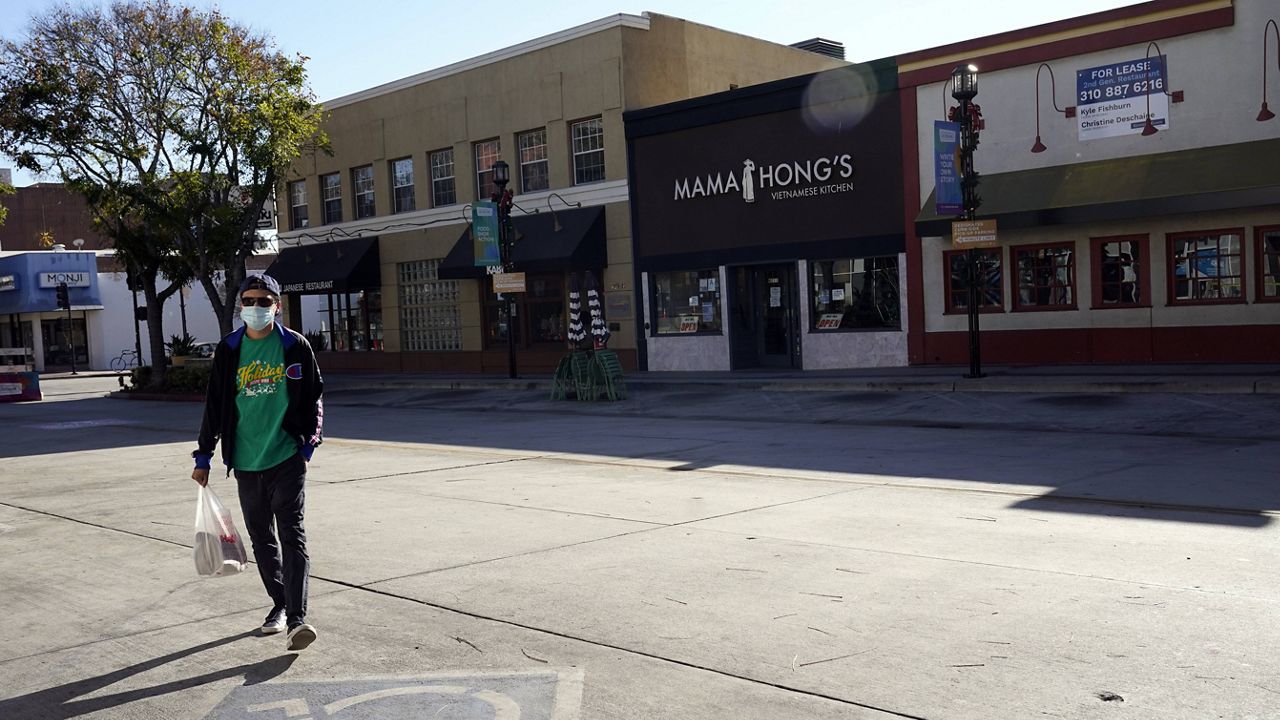UPLAND, Calif. — People ask James Panzarello the same question all the time: Why are you opening a restaurant while the pandemic is still going on?
Panzarello's answer: "It's the right time."
Despite the coronavirus pandemic, business restrictions, and the restaurant industry's struggles last year, Panzarello and his wife signed a 5,100 square foot lease in March to open a new restaurant at the Mountain Plaza retail center in Upland.
Panzarellos, the name of the restaurant, will be an Italian and Mexican fusion joint, a "blend of two cultures," James Panzarello said. Panzarello is an Italian American. His wife, Lilly, is a Mexican American.
"The market is right," Panzarello said. "We looked at the market. We felt confident with herd immunity coming around, the vaccines coming around, and the rate people are getting the vaccine. We felt confident that this is the right time to open a restaurant."
Panzarello is not alone.
Regardless of the continuing coronavirus pandemic, commercial retail real estate brokers are noticing an uptick in interest of entrepreneurs signing retail and restaurant space since the start of the year.
People are craving and sensing a return to normalcy, and entrepreneurs and businesses are trying to capitalize on the pent-up demand once the pandemic is over, possibly later this year, experts said. It's an encouraging sign that the U.S. economy is bouncing back.
"Things have been super busy. There's a lot of positive energy," said Roxanne Klein, a retail sales and leasing specialist at Progressive Real Estate Partners. Klein has helped her clients find retail space and sign leases for new retail, restaurants, and staffing agency businesses.
"Things were challenging during the pandemic," she said. "But there's a lot of optimism going on right now."
Matt Hammond, senior vice president and partner at Orange County-based Coreland Cos., said retail leasing activity began to pick up at the beginning of the year.
"It stems from all of the positive news that we're seeing — the vaccines, schools reopening, and other things opening up down the road," Hammond said. "A lot of retailers are signing deals now because they have a six to 12-month window. They are not opening immediately. In their minds, they are looking at where the market is going to be six to 12 months from now."
Where's the market going to be later this year?
"It's going to be open," Hammond said.
Last year, the pandemic had a significant negative impact on the retail and restaurant landscape. Many said it exacerbated the so-called retail apocalypse, the supposed death of brick-and-mortar stores.
According to a Cushman & Wakefield report, nearly 15,000 stores closed in the U.S. in 2020, leaving a massive 15 million square feet of shopping center retail space vacant. The retail vacancy rate was at its highest in seven years. Another 10,000 stores expect to close this year.
Nationwide, employers cut more than eight million retail and restaurant jobs in March and April 2020, the report released in March said. More than 12 million people were working in the food and beverage industry before the pandemic. By April 2020, there were 6.3 million.
However, the retail and restaurant industry began to rebound slowly. Retail and restaurant owners began to adapt to the new normal – omnichannel marketing, e-commerce, delivery, curbside pickup, and the paycheck protection program kept many businesses afloat.
As the year went on and the pandemic continued, the introduction of several vaccines boosted business and consumer confidence. That's one of the primary reasons leasing activity across the nation, including Southern California, is picking up. Many expect herd immunity to be achieved by September.
"The arrival of effective vaccines is likely to act as a tipping point as early as the second half of 2021," a JLL retail report recently said. "Prime high streets and shopping centers are expected to see a gradual return of customers with pent-up demand and social consumption driving sales. Most major retail markets are anticipated to see a cautious recovery in leasing activity in 2021, and a further pickup in 2022."
Hammond of Coreland said leasing activity in Southern California expects to continue throughout the year as coronavirus cases go down and Los Angeles and Orange County quickly graduate through the state's four color-coded tier system that monitors coronavirus cases,
"It solidifies everyone's thoughts and optimism," Hammond said. "At the end of the day, retail is predominantly made up of small businesses, and if you're a small business owner and entrepreneur, you're naturally optimistic. And you're a risk-taker."
Retail thrives off of consumer confidence, Hammond said.
"As California emerges from the pandemic, we're seeing people want to go out, go out to shop, eat and seek entertainment," Hammond said. "That's the feeling since January, and as we're moving from tier-to-tier, that's great for our industry."
Panzarello, the new restaurant owner, is banking on pent-up consumer demand to drive sales for his restaurant once it opens. He saw firsthand the devastating impact the pandemic had on business. Both of his banquet halls closed.
But he believes this is a good time to open a new venture, a restaurant, as the pandemic wanes. It's a risk he's willing to take.
The restaurant, which will offer fusion menu items such as Italian enchiladas and Mexican pizza, is slated to open in June. They will provide breakfast, lunch, and dinner. Learning from customers' wants during the pandemic, they'll partner with delivery companies and have a separate counter just for takeout.
"One of our mottoes has always been, 'If we survive, we'll thrive,'" said Panzarello, who, along with his wife, Lilly, has been in the food and beverage business for more than 20 years. "We feel good. We have a good marketing plan. We have a unique menu. People are going to love our food.
"At the end of the day, everything is a chance," he added. "Every entrepreneur, whether you start with a big bankroll or you barely open the door using your last penny, it's a risk. But we're confident."






